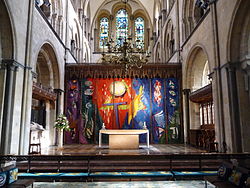Ralph Neville
| Ralph Neville | |
|---|---|
| Bishop of Chichester | |

Ralph Neville was buried behind the high altar in Chichester Cathedral
|
|
| Province | Canterbury |
| Elected | before 1 November 1222 |
| Term ended | 1–4 February 1244 |
| Predecessor | Ranulf of Wareham |
| Successor | Robert Passelewe |
| Other posts |
Lord Chancellor Archbishop-elect of Canterbury Bishop-elect of Winchester |
| Orders | |
| Consecration | 21 April 1224 |
| Personal details | |
| Died | 1–4 February 1244 London, England |
| Buried | Chichester Cathedral |
| Lord Chancellor (Keeper of the Great Seal) | |
|
In office 1226–1238 |
|
| Monarch | Henry III |
| Preceded by | Richard Marsh |
| Succeeded by | Richard le Gras |
| Lord Chancellor | |
|
In office 1242–1244 |
|
| Monarch | Henry III |
| Preceded by | Richard le Gras |
| Succeeded by | Silvester de Everdon |
Ralph Neville (or Ralf Nevill; died 1244) was a medieval clergyman and politician who served as Bishop of Chichester and Lord Chancellor of England. Neville first appears in the historical record in 1207 in the service of King John of England, and remained in royal service throughout the rest of his life. By 1213 Neville had custody of the Great Seal of England, although he was not named chancellor, the office responsible for the seal, until 1226. He was rewarded with the bishopric of Chichester in 1222. Although he was also briefly Archbishop-elect of Canterbury and Bishop-elect of Winchester, both elections were set aside, or quashed, and he held neither office.
As keeper of the seal, and subsequently as chancellor, Neville was noted for his impartiality, and he oversaw a number of changes in the way the chancery operated. Neville was deprived of the Great Seal in 1238 after quarrelling with the king, but continued to hold the title of chancellor until his death. He died in his London palace, built on a street later renamed Chancery Lane owing to his connection with the chancery.
Neville, who was illegitimate, had at least three brothers: Nicholas de Neville, a canon at Chichester Cathedral; William de Neville, treasurer of the see of Chichester; and Robert de Neville, holder of a prebend at Chichester. The identity of their father is unknown, but another likely sibling was Roger, who held land in Lincolnshire. Robert became Chancellor of the Exchequer, and Nicholas a baron of the Exchequer. Ralph Neville was also related to Hugh de Neville, King John of England's chief forester.
Neville was a royal clerk to King John in the spring of 1207, and in December of that year was at Marlborough Castle on royal business. Earlier references to a Ralph Neville who in 1207 delivered items to Hugh de Neville, or the Ralph Neville who was the same Hugh de Neville's chaplain, may be to the future bishop, but the evidence is inconclusive. Hugh de Neville and Neville subsequently worked together, and corresponded on both business and personal affairs. Both men claimed the other as a kinsman.
...
Wikipedia
